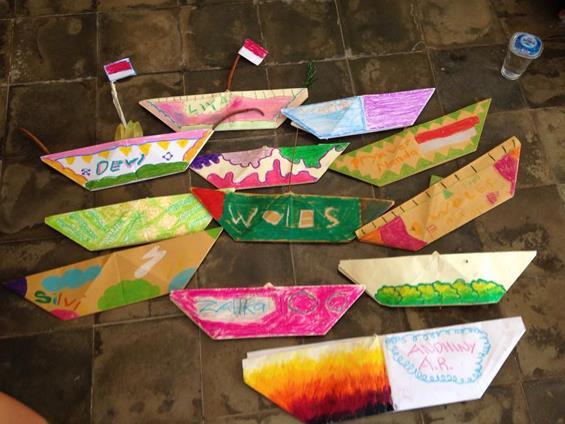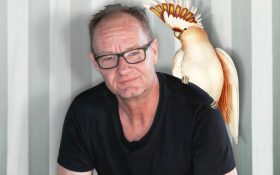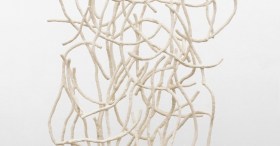Children’s work as part of Polyglot’s project in Java. Photo via Polyglot
I was in Java as the arts news that has shocked and angered the arts community in Australia broke over our heads. It emphasised the difference in our cultural understanding and acceptance of the arts. In Indonesia the arts are embedded as a way of life without question and deeply, often invisibly ingrained.
In Australia it is seen as something outside of everyday experience ; something that is a luxury, or a waste of tax payers money, or a special occasion. The support and advocacy necessary around diverse arts practice in Australia was one of the vital roles of Australia Council, especially for the small to medium and independent sector.
Polyglot has worked in Indonesia on four major projects in the span of just over a year, thanks to the Australian International Cultural Council and Australia Indonesia Foundation as well as with the interest, encouragement and support of the Australia Council and Creative Victoria.
Creating connection when relationships are strained
This has meant collaborative works between Polyglot and Papermoon Puppet Theatre in Java,and work with children in Duri, Sumatra. These projects have come about because of a real and abiding friendship and artistic compatibility between Papermoon and Polyglot and our other partners. It’s also about our desire to expand our practice, to put our process to the test, to work in new ways with communities in creative conversation and discover how, with very little language, powerful experiences can be created in relatively short amounts of time and with small budgets. The effect of these projects has been called soft diplomacy, bringing connection between our two countries at times when relationships are strained.
With these projects we also have a huge amount of fun in the most extraordinary places. This one was no exception. Imagine going to a fishing village in Northern Java and making a play where 40 children squeeze onto a real boat and are taken up a real river to the sea and experience the real story of a goddess visiting the actual fisherman whose boat we are on. Imagine doing the same play in a village near Yogyakarta 20 minutes from the ocean where local men build a bamboo boat in 5 hours from chopping the bamboo down to installing the last flag. Things happen quickly and whole communities are involved.
This most recent visit to Java was the first stage in the development of a new work for younger audiences, drawing on the experience and reality of children in Lasem on the northern coast of Java. Papermoon brought us here, knowing that the inspiration of the area would be a fantastic way to open up new ideas. Our working days were spent on the open pillared verandah of an ancient Chinese house, in the sticky heat, with 40 or so children from babies to young teens. We drew madly while the paper softened in the heat, we made cardboard boats and floated them on the local salt ponds, we played games, made puppets and met the local people in the warungs and in the streets. Mobs of children took us for walks around their village and taught us words- shouting with laughter as we fumbled with the simplest things. It’s a joy to be in the learning seat with kids as the teacher – their patience and generosity is boundless.
Lasem was the most important port in Java for centuries. It has an extraordinary history that tells the relationship, often troubled, between Javanese, Muslim and Chinese people of this area. It was also the major arrival port for immigration to Indonesia, from China, and where the invading forces(Dutch and Japanese) landed. This history, and the temples and sites that tell the story, are the focus of several committed locals who are trying to get Lasem recognised as a heritage area. This is spearheaded by our host, Mas Toro, whose campaign brings the three distinct cultures together in simple and community based ways including radio, and our project.
What we stand to lose
It’s incredibly dispiriting to hear the doors closing with a bang against originality, courage and inspiration in the arts, to realise that exploration and new ideas are deliberately and publicly stifled. The enormous contempt and ignorance in this action is the hardest thing to bear. It ignores the startling achievement, accountable and lean operations, international success and contribution to the wealth of Australia in economic and cultural terms by the people who will be most affected by the cuts to Australia Council. It ignores the diplomatic work being done by us and so many others like us, in countries where Australia’s reputation is steadily growing worse and worse.
Julie Bishop look around you! DFAT is aware of the work being done – we’ve only just returned from Minami Sanriku in Japan as part of that town’s recovery from disaster. The arts are working in ways this government is unware of; locally, regionally, nationally and internationally.
Polyglot’s collaborations in Indonesia have taught us much. There, the arts community is entirely independent with little or no funding. But there, anything is possible because everyone is involved.
There, no one is saying from on high what is good art and what is not. The people are the ones who do and see and experience art without prejudice and without resentment and instead with a certainty that requires no explanation. Not so in our own country.
We should be proud that Australian governments fund the arts because this means that the arts are important to us. We nearly even had a cultural policy once. But whose decision should it be – this idea of what art is? The democratic processes around arts funding were set up so that arms length, non-political funding would be possible, and that those who were expert were part of the decision making. Do you let non-scientists make decisions about science? Why does the idea of peer assessment scare our government?
The changing nature of arts and theatre across the world is also ignored in our current situation. Australian small to medium companies and independent artists currently touring the world are bringing to audiences a perspective on theatre making that is new and fascinating to them. Our particular situation as a country – our immigration history, our unique Indigenous culture, our isolation and therefore invention, our brashness and willingness to work fast, on impulse and with guts – all this speaks loudly and positively across the globe.
Our collaborative practices with other cultures and artistic residencies were increasing and formed the basis for long term relationships with other countries and communities: another incentive from AusCo. Collaborative work means new energy behind arts practice,connection across understandings of process,working to different rhythm and time, working across language and finding commonality through play and theatre and all this is about humanity and making things possible. It doesn’t slam doors. It doesn’t hide behind smug self righteous abuse of the other. It does the absolute opposite.
In Indonesia and at home, Polyglot and Papermoon are making magic together and together we will cross borders, cultures and languages in an expression of a universal language that is subjective, intangible, bewildering, hilarious, dangerous and not quiet.
Look out for Cerita Anak: Child’s story.





